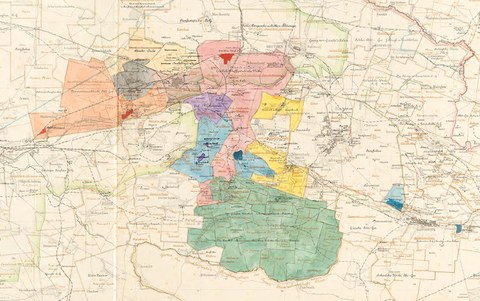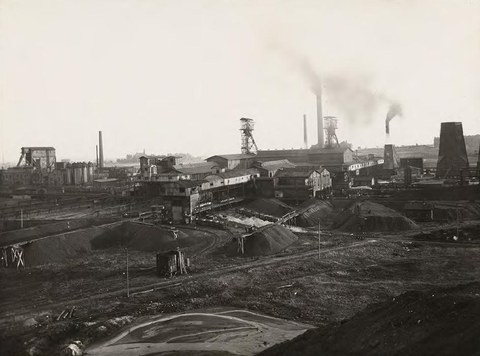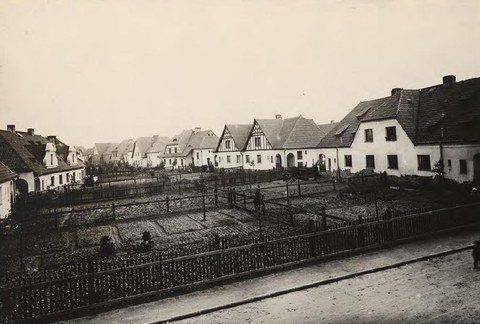Industrialization in Upper Silesia in the 'Age of Extremes' A Cultural History of Economics Using the Example of the Ballestrem Corporation, ca. 1890-1950

Map section of pit fields and plants of the Ballestrem enterprise in Upper Silesia
Current call for proposals for a planned conference in Dresden, June 1-2, 2023.
Call for Papers - deutsch
Call for Papers - english
Deadline: March 15, 2023
Period: 05/2021-10/2023
No process shaped the “Transformation of the World" in the 19th century more than the industrialization of Europe, which initially only took place in individual regions of textile or heavy industry. Upper Silesia was a pioneer region of industrialization, where rapidly growing industrial production transformed the previously predominantly agricultural landscape through the construction of mines and smelters, workers' settlements and their connection with railroad lines. The borderlands of the German, Russian, and Austro-Hungarian empires shaped the ethnic composition of the workforce as well as the economic practices of the Upper Silesian entrepreneurial dynasties that emerged from the large landowning aristocracy. In the first half of the 20th century, the region was pivotal for heavy industry and arms production. With partitions and moving borders as a result of two World Wars, the founding of the national state of Poland, the rise of nationalsocialist Germany and the building of state socialism after the end of World War 2, the region experienced broad ethnical shifts and with the nationalization of metallurgy and heavy industrie the end of entrepreneurial activities from the former industrial tycoons.

Friedensgrube in Friedenshütte
The project merges economic-historical with cultural-historical perspectives and methods to reconstruct the history of the industrial character of Upper Silesia in the German-Polish border region and to integrate economic history into general cultural history. Using the Ballestrem corporation as a case study, the company history as a microhistory of Upper Silesian heavy industry can be combined with the material and immaterial shaping of industrial culture across the disruptions of the 20th century.

Arbeiterwohnhäuser der Kolonie Rokittnitz
The communicative, representative, educational, and tradition-forming dimensions of workers' welfare, church, settlement, and company headquarters architecture, collection activities, and patronage will be examined, as will the development of raw materials and sales markets, technical innovations, the use of forced labor, and the handling of environmental destruction. The study of economic resilience and the ability to withstand crises, the formation of international networks, political commitment and adaptation in changing political and economic contexts are intended to illustrate the changes and continuities of aristocratic leadership in the "Age of Extremes”.
realization and results
Event archive
Excursion and Workshop | Zabrze | April 20 - 22, 2022
In April 2022 fifteen historians* visited places of Ballestrem's activity in Zabrze, Gliwice and Pławniowice, Ruda and Rokitnica. The members of the project group explained aspects of economic development, networks and relationships, workers' welfare and the construction of workers' colonies as well as the foundation work, especially church buildings at the historical sites.
Program Workshop Zabrze - deutsch
Kick-off workshop| Digital | 13. – 15. Oktober 2021
The program of the kick-off workshop can be found here | [DE] / last update 7.10.2021
Call for Articles | Deadline: 31.07.2021 | [DE] [EN] [PL]
Contact
Steffen Heidrich, M.A.
E-Mail:
Tel.: +49 (0)351 463 31663
Fax: +49 (0)351 463 37769
